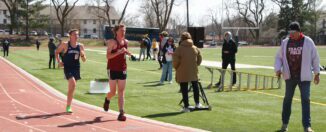ALSS Heartland Summit Conference Covers First Amendment Issues in Lutheran Schools
by Taylor Roby
Administrators from various Lutheran Church—Missouri Synod high schools gathered at Concordia University, Nebraska from Oct. 23-25 for the Heartland Summit Conference, which covered First-Amendment issues and questions.
“Politically speaking, this is a very tenuous time for Lutheran schools,” Associate Professor of Education Dr. Bernard Tonjes said. “There are upcoming court decisions that could make life very difficult for those in religious institutions.”
The Heartland Summit Conference is held on the Concordia campus every other year. The theme of the conference this year was “Sufficiently Religious,” which touched on being faithful to doctrines and Scripture in challenging times.
There were four main presenters at the conference: Kirby Klappenback, Mark Fahleson, Terry Schmidt, and Dr. Russ Moulds.
Klappenback, director of risk management and Title IX coordinator at Concordia, discussed issues that may be encountered with families in Lutheran schools.
Fahleson, a Nebraska attorney and former chairman of the Nebraska Republican party, specifically addressed the complex relationship between employment and ministry.
Schmidt, the director of LCMS School Ministry helped to lead discussions and develop plans that administrators can use in certain situations.
Moulds, professor of education and psychology, and director of the Two Kingdoms Network, helped the administrators examine a Scriptural view of church and state.
“Lutheran schools may need to be concerned about legal challenges from the government regarding religious liberty and civil rights,” Moulds said. “I’ll help participants examine these issues in terms of the Scripture’s teachings about government and the Christian in the world—which we generally call the Two Kingdoms doctrine.
In addition to attending the sessions, the administrators had the opportunity to discuss First-Amendment issues with one another, with time intentionally allotted for networking and fellowship. This allowed them a support system and varying perspectives.
“One key issue is whether the judiciary will change its historically respectful disposition towards religious liberty or not,” Moulds said. “Some are concerned that the courts will redefine religious liberty as private opinion and constrict the role of religion in the public square. Others maintain that will be seen as too narrow an understanding of the First Amendment and unlikely because it is too narrow and unrealistic according to the First Amendment.”
Concordia professors also attended some of the sessions, and their feedback will be relayed to education students so they can better understand and prepare for their field.
“If we want to be the church’s college for teachers, we need to be involved in doing things that help Lutheran schools be more successful,” Tonjes said. “Also, we must be informed about current issues that Lutheran schools are facing so future educators can be well prepared and equipped for the issues they will face.”













